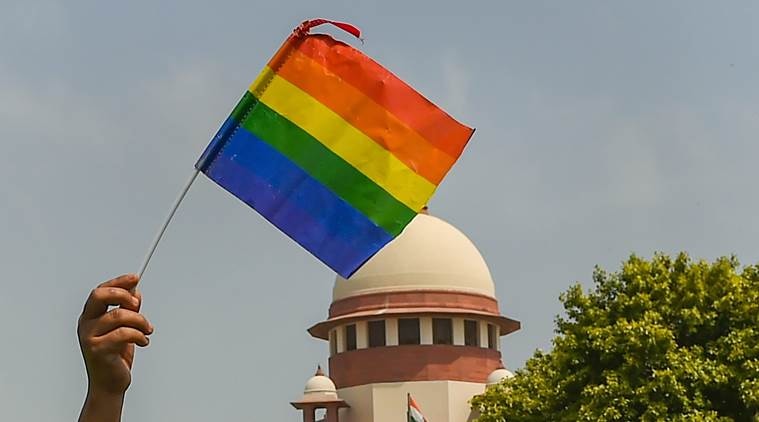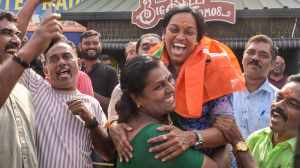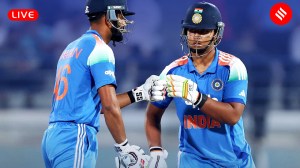In 2013, the Supreme Court Bench of Justices G S Singhvi and Sudhansu Jyoti Mukhopadhaya overruled a ruling by a Delhi High Court Division Bench that had, in 2009, read down Section 377 of the IPC. The two-judge Supreme Court Bench observed that the High Court ruling “had overlooked that a minuscule fraction of the country’s population constitute lesbians, gays, or transgenders”.

On Thursday, the Constitution Bench headed by Chief Justice of India Dipak Misra, which read down Section 377, differed on both these views expressed by the Supreme Court Bench in 2013.
“… This court overturned the decision of the Delhi High Court… thereby upholding the constitutionality of Section 377 and stating a ground that the LGBT community comprised only a minuscule fraction of the total population and that the mere fact that the said section was being misused is not a reflection of the vires of the section. Such a view is constitutionally impermissible,” CJI Misra said. He observed that if Section 377 “remains in its present form in the statute book, it will allow the harassment and exploitation of the LGBT community to prevail.”
Justice D Y Chandrachud, also on the Constitution Bench, referred to last year’s judgment on the right to privacy while observing that the 2013 judgment had been “eroded and even disapproved”. He referred to Justice S K Kaul’s observation that he was in agreement with Justice Chandrachud in “that the right of privacy cannot be denied, even if there is a miniscule fraction of the population which is affected”.
Read | Supreme Court’s verdict on Section 377: 493 pages, 5 judges, one mantra of Constitutional Morality
The 2013 judgment had referred to the High Court’s “anxiety to protect the so-called rights of LGBT persons”. To declare that Section 377 IPC violates the right to privacy, autonomy and dignity, the High Court “extensively relied upon judgments of other jurisdictions”, the Supreme Court then observed, adding that these “cannot be applied blindfolded for deciding the constitutionality of a law enacted by the Indian legislature”. It held that the High Court was not right in declaring Section 377 IPC vires Articles 14 and 15 of the Constitution.
Story continues below this ad
From the Constitution Bench Thursday, Justice R F Nariman held that “when it is found that privacy interests come in and the state has no compelling reason to continue an existing law which penalises same-sex couples who cause no harm to others… it is clear that Articles 14, 15, 19 and 21 have all been transgressed without any legitimate state rationale to uphold such provision.”
Read | Section 377 verdict: The world India has left
Section 377: Victory and defeat
DECRIMINALISED, 2009
Chief Justice A P Shah & Justice S Muralidhar
Naz Foundation vs Govt Of NCT of Delhi, Delhi High Court, July 2, 2009
A 2001 plea against Sec 377 IPC was dismissed in 2004, but was remitted back to the HC by the SC in 2006.
This time, HC ruled: “We declare that Section 377 IPC, insofar it criminalises consensual sexual acts of adults in private, is violative of Articles 21, 14 and 15 of the Constitution. The provisions of Section 377 IPC will continue to govern non-consensual penile non-vaginal sex and penile non-vaginal sex involving minors…”
RECRIMINALISED, 2013
Justice G S Singhvi & Justice S J Mukhopadhaya
Story continues below this ad
Suresh Kumar Koushal & Anr vs Naz Foundation & Ors, Supreme Court, Dec 11, 2013
Within a week of the HC judgment, Suresh Kumar Koushal and 15 others moved the SC in appeal.
The SC ruled: “The High Court was not right in declaring Section 377 IPC ultra vires Articles 14 and 15… (It) overlooked that a minuscule fraction of the country’s population constitute lesbians, gays, bisexuals or transgenders and in last more than 150 years less than 200 persons have been prosecuted… HC (order) is legally unsustainable… “
Read | After Section 377 verdict, police face the unfamiliar: ‘victim’ men, what’s ‘consent’
Story continues below this ad
Arguments made for Sec 377: Parliament’s job, check on AIDS
What the counsel for intervenors Apostolic Alliance of Churches, Utkal Christian Council and Trust God Ministries argued during the hearing on Section 377:
Manoj George, Counsel for Apostolic Alliance of Churches and Utkal Christian Council, argued that:
* Anything that needs to be done to Section 377 as sought by the petitioners, should be left to Parliament.
* IPC falls in the concurrent list. If any of the states wanted to amend it, they would have done so but they have not.
Story continues below this ad
* Sexual orientation has not been defined in the Constitution or IPC. Words cannot be imported into the statute. The court should not add or delete words to the statute. This is the job of Parliament.
* Section 377 classifies carnal intercourse within & against the order of nature; this is a reasonable classification.
K Radhakrishnan, For Trust God Ministries, argued that:
* Section 377 is a modern medico-legal necessity to counter AIDS. Homosexuality has led to spread of HIV/AIDS in USA. If Section 377 is struck down, HIV/AIDS will spread rapidly; India will lose nobility, character, virtuousness.
* Fallout of striking down Section 377 is that the family system, which is the bulwark of Indian social structure, would be reduced to a shambles.
Story continues below this ad
* Gender identity and sexual orientation are not criminalised. Section 377 criminalises certain acts.

 New Delhi: An activist waves a rainbow flag after the Supreme Court verdict which decriminalises consensual gay sex, outside the Supreme Court in New Delhi (PTI)
New Delhi: An activist waves a rainbow flag after the Supreme Court verdict which decriminalises consensual gay sex, outside the Supreme Court in New Delhi (PTI)





































